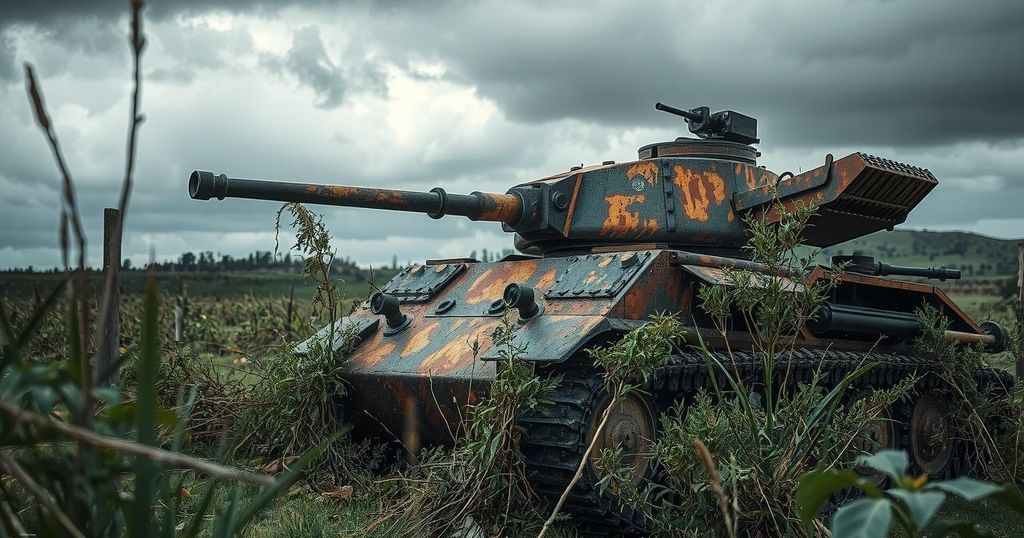World news
ASIA, DEFENCE, ENERGY INFRASTRUCTURE, EUROPE, EUROPE/ASIA, KOREA, NORTH, KURSK, KY, KYIV, MILITARY, MISSILE ATTACK, MOSCOW, NEW YORK TIMES, NEWSWEEK, NORTH KOREA, OLE, OLEKSANDR KINDRATENKO, PYONGYANG, RUSSIA, SUDZHA, U. S, UKRAINE, UKRAINIAN SPECIAL OPERATIONS FORCES, VLADIMIR PUTIN, VOLODYMYR ZELENSKY, WAR
Fatima Khan
0 Comments
North Korean Troops: Their Role and Impact in the Ukraine Conflict
Following an initial deployment of North Korean soldiers in support of Russian forces in Ukraine, reports indicate a significant reduction in their combat presence. Estimated losses are high, with claims that many soldiers lack proper equipment and experience in modern warfare tactics. Captured North Korean troops have expressed concerns over the consequences of capture, reflecting internal conflicts within their ranks. Both nations seem hesitant to address the situation publicly as the conflict persists.
After a period of significant observation concerning the deployment of North Korean soldiers in the conflict alongside Russian forces in Ukraine, reports suggest these troops have seemingly withdrawn from combat. According to Colonel Oleksandr Kindratenko of the Ukrainian Special Operations Forces, North Korean military involvement had been noted near the Kursk region but has dwindled over the last three weeks. Despite initial expectations of substantial military support, the North Korean contingent, provided by leader Kim Jong Un, faced significant casualties amid their deployment.
North Korean forces were estimated at around 12,000, with reports indicating that nearly half had been killed or injured since their arrival. While some military sources labeled them as “cannon fodder,” others noted their discipline and physical readiness, indicating their military training may not directly translate into effective combat capability. The soldiers from North Korea have reportedly engaged in assaults characterized by high casualty rates due to their lack of experience in modern warfare tactics, particularly drone warfare.
Ukrainian forces have managed to capture several North Korean POWs, with President Volodymyr Zelensky releasing footage of interrogations of two captured soldiers. The accounts suggest a great fear of reprisal from North Korean authorities compels many soldiers to take their own lives to avoid capture. Additionally, brief exchanges with these POWs indicate differing desires regarding return, highlighting a complex moral and personal dilemma within this conflict.
Analysis of the North Korean troops reveals they entered combat with insufficient protective gear, often lacking helmets and ballistic plates. Intelligence from Colonel Kindratenko indicates these soldiers prioritized speed for assaults, carrying minimal provisions beyond ammunition, suggesting a focus on maintaining a fast-paced offensive rather than individual soldier safety. Despite these disadvantages, they reportedly possess superior armaments compared to their Russian counterparts, utilizing modernized weaponry that enhances their combat effectiveness in Ukraine.
Both Russia and North Korea have generally refrained from publicly acknowledging these developments, including the personal losses incurred in this military involvement. As the situation evolves in Ukraine, it remains uncertain when North Korean soldiers may return to the battlefield or if reinforcements are forthcoming. The future trajectory of these forces could depend on additional training or strategic reorganization, indicating ongoing volatility in the conflict.
The involvement of North Korean soldiers in the Ukraine conflict highlights the complexities of international military alliances and the impact of geopolitical dynamics. With North Korea historically being a close ally of Russia, their deployment underscores the commitment between these nations amidst ongoing tensions with Ukraine. The operational effectiveness of North Korean troops, characterized by a lack of experience yet significant willingness to engage, presents unique challenges for both Ukrainian and Russian strategies in this prolonged conflict. Additionally, the psychological factors influencing combatants, such as the fear of repercussions on their families, offers a crucial understanding of their actions on the battlefield.
The situation of North Korean soldiers in Ukraine encapsulates the harsh realities of modern warfare and the consequences of military alliances. Despite their initial deployment, the significant casualties faced by these troops and their reported lack of essential combat gear have raised concerns regarding their effectiveness in the ongoing conflict. The dynamics between Russia and North Korea, along with the psychological impact on those soldiers, continue to emphasize the complexities within this multifaceted war.
Original Source: www.newsweek.com




Post Comment